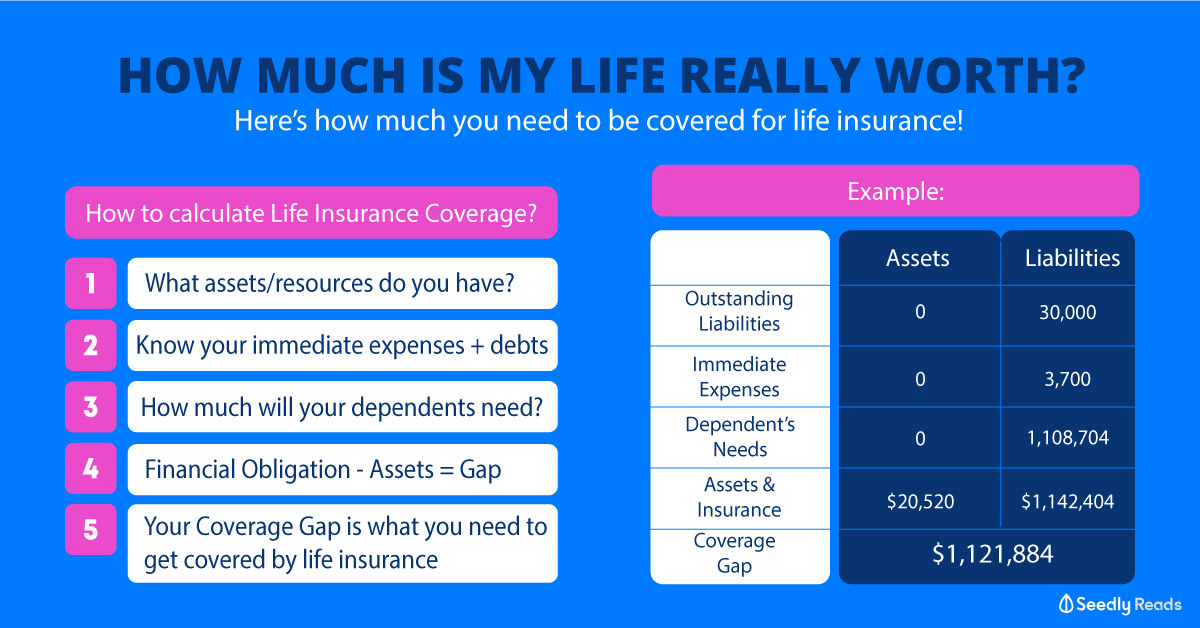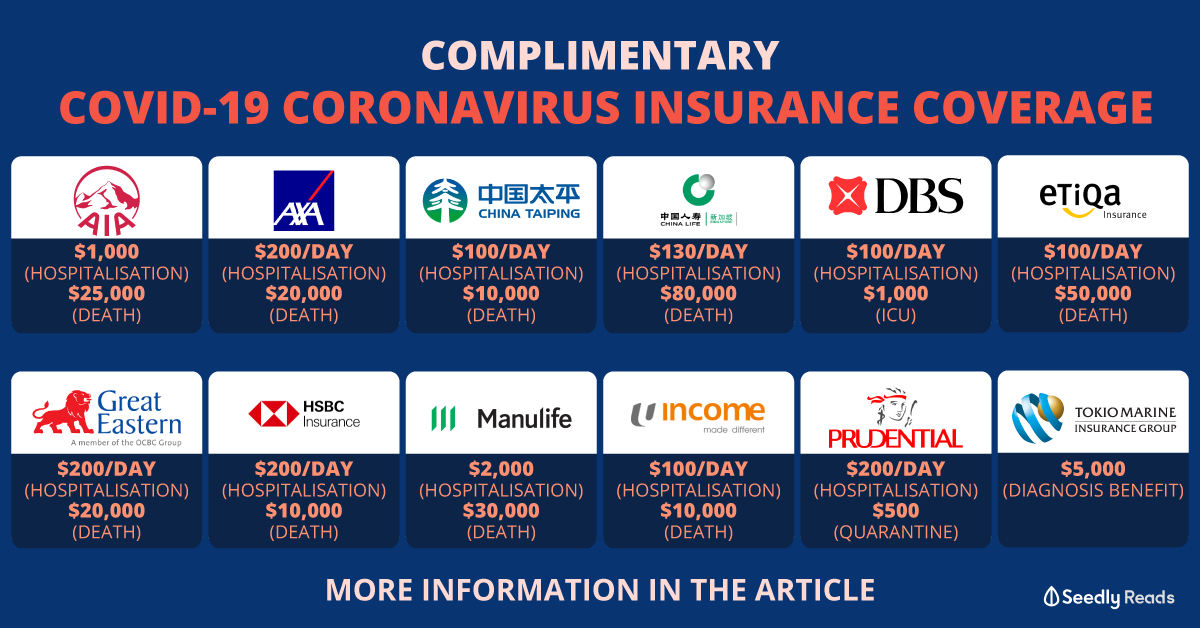Let's take a look at the concept of insurance first. Insurance is really just risk transfer. By way of a contract, insurance allows you to transfer the risk (measured in a quantifiable number) to a party (the insurer) who is able to take on the risk. The risk can be anything such as loss of income, hospital bills, long term care costs etc. In exchange for honouring the contract, the insured party agrees to pay a sum of money determined by the insurer, most of which to the risk pool (after accounting for costs), which is paid out upon the insured event occuring.
So with that in mind, when is it that you have too much cover? One could say that if you passed on prematurely at 25, you would have lost 40 years of income. So is the right amount 40 x your annual income? Yes and no. Yes if you believe that you had that potential to earn (not even counting inflation or salary increases) that amount and didn't want to see it disappear. No if you believe that with a lesser payout and some proper management of the payouts, the income generated from the payouts could be used to generate the lost income. Not to mention, the premiums are higher for a greater coverage amount.
With that in mind, you can see that there are a lot of ways to determine the 'right' amount of coverage. So to simplify things, we have 'rules of thumb' or guidelines that make it easier to calculate the actual amount of cover needed.
For example
- Death cover: 10 times of your annual income
- Death cover: Your liabilities as well as funds to maintain your family's standard of living
- CI cover: 5 times of your income
- CI cover: 5 years of expenses plus a baseline for out of pocket costs
- CI cover: 5 times of your income each time I am diagnosed (i.e. multi pay)
- Long Term Care: Enough funds to have a caregiver come to my home to help me
- Long Term Care: Enough funds for me to afford nursing home bills
You can see that even with rules of thumb, there is no 'right' or 'wrong' answer. So that is where you need to combine what you need with the affordability factor. As a rule of thumb, you should not be spending more than 10% of your income on essential coverage. (Sometimes it does exceed a little, but 11%-12% is still okay)
So in the end, how much is too much? I would very much like to have 10 times annual income as CI payout rather than 5 times, but if that's costing me 10%, you would be better off financially getting 5 times first, and then add on more later.
One of the most memorable potential 'overpaying' scenarios I have encountered was with accident plans: Usually these can be bought over the phone from a telemarketer, I once met a hawker with 7 accident plans. No two plans were similar, but there was a lot of overlapping cover. Now that's ok if you can afford it, but if you can't, it doesn't make sense. II recommended that he cut it down to 2 policies with the least amount of overlap.
Having said that, insurers also have financial underwriting guidelines, so they will also not allow one to purchase too much.
So in summary, ask yourself what you need, and if it is within affordability limits, that will generally be ok. Speak with an advisor whose job is also to point out any gaps that you did not think of. I once had a client who wanted to get a term plan to cover the house mortgage, so he wanted an amount exactly on the mortgage amount. But he also had 2 kids to raise, and he'd completely forgot to count in the costs involved with raising them. So I pointed it out to him. You'll also want to ensure that you get a cost effective policy by comparing across different insurers; this is where an independent advisor distributing multiple insurer products comes into play. If you feel you are already paying too much, a review of your current coverage may be necessary to see what is essential and what is not.









Let's take a look at the concept of insurance first. Insurance is really just risk transfer. By way of a contract, insurance allows you to transfer the risk (measured in a quantifiable number) to a party (the insurer) who is able to take on the risk. The risk can be anything such as loss of income, hospital bills, long term care costs etc. In exchange for honouring the contract, the insured party agrees to pay a sum of money determined by the insurer, most of which to the risk pool (after accounting for costs), which is paid out upon the insured event occuring.
So with that in mind, when is it that you have too much cover? One could say that if you passed on prematurely at 25, you would have lost 40 years of income. So is the right amount 40 x your annual income? Yes and no. Yes if you believe that you had that potential to earn (not even counting inflation or salary increases) that amount and didn't want to see it disappear. No if you believe that with a lesser payout and some proper management of the payouts, the income generated from the payouts could be used to generate the lost income. Not to mention, the premiums are higher for a greater coverage amount.
With that in mind, you can see that there are a lot of ways to determine the 'right' amount of coverage. So to simplify things, we have 'rules of thumb' or guidelines that make it easier to calculate the actual amount of cover needed.
For example
You can see that even with rules of thumb, there is no 'right' or 'wrong' answer. So that is where you need to combine what you need with the affordability factor. As a rule of thumb, you should not be spending more than 10% of your income on essential coverage. (Sometimes it does exceed a little, but 11%-12% is still okay)
So in the end, how much is too much? I would very much like to have 10 times annual income as CI payout rather than 5 times, but if that's costing me 10%, you would be better off financially getting 5 times first, and then add on more later.
One of the most memorable potential 'overpaying' scenarios I have encountered was with accident plans: Usually these can be bought over the phone from a telemarketer, I once met a hawker with 7 accident plans. No two plans were similar, but there was a lot of overlapping cover. Now that's ok if you can afford it, but if you can't, it doesn't make sense. II recommended that he cut it down to 2 policies with the least amount of overlap.
Having said that, insurers also have financial underwriting guidelines, so they will also not allow one to purchase too much.
So in summary, ask yourself what you need, and if it is within affordability limits, that will generally be ok. Speak with an advisor whose job is also to point out any gaps that you did not think of. I once had a client who wanted to get a term plan to cover the house mortgage, so he wanted an amount exactly on the mortgage amount. But he also had 2 kids to raise, and he'd completely forgot to count in the costs involved with raising them. So I pointed it out to him. You'll also want to ensure that you get a cost effective policy by comparing across different insurers; this is where an independent advisor distributing multiple insurer products comes into play. If you feel you are already paying too much, a review of your current coverage may be necessary to see what is essential and what is not.